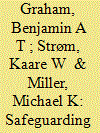|
|
|
Sort Order |
|
|
|
Items / Page
|
|
|
|
|
|
|
| Srl | Item |
| 1 |
ID:
161555


|
|
|
|
|
| Summary/Abstract |
Barbara Walter’s application of reputation theory to self-determination movements has advanced our understanding of why many separatist movements result in armed conflict. Walter has shown that governments of multi-ethnic societies often respond to territorial disputes with violence to deter similar future demands by other ethnic groups. When governments grant territorial accommodation to one ethnic group, they encourage other ethnic groups to seek similar concessions. However, a number of recent empirical studies casts doubt on the validity of Walter’s argument. We address recent challenges to the efficacy of reputation building in the context of territorial conflicts by delineating the precise scope conditions of reputation theory. First, we argue that only concessions granted after fighting should trigger additional conflict onsets. Second, the demonstration effects should particularly apply to groups with grievances against the state. We then test the observable implications of our conditional argument for political power-sharing concessions. Using a global sample of ethnic groups in 120 states between 1946 and 2013, we find support for our arguments. Our theoretical framework enables us to identify the conditions under which different types of governmental concessions are likely to trigger future conflicts, and thus has important implications for conflict resolution.
|
|
|
|
|
|
|
|
|
|
|
|
|
|
|
|
| 2 |
ID:
156698


|
|
|
|
|
| Summary/Abstract |
Democracy is often fragile, especially in states recovering from civil conflict. To protect emerging democracies, many scholars and practitioners recommend political powersharing institutions, which aim to safeguard minority group interests. Yet there is little empirical research on whether powersharing promotes democratic survival, and some concern that it limits electoral accountability. To fill this gap, we differentiate between inclusive, dispersive, and constraining powersharing institutions and analyze their effects on democratic survival from 1975 to 2015 using a global dataset. We find sharp distinctions across types of powersharing and political context. Inclusive powersharing, such as ethnic quotas, promotes democratic survival only in post-conflict settings. In contrast, dispersive institutions such as federalism tend to destabilize post-conflict democracies. Only constraining powersharing consistently facilitates democratic survival regardless of recent conflict. Institution-builders and international organizations should therefore prioritize institutions that constrain leaders, including independent judiciaries, civilian control of the armed forces, and constitutional protections of individual and group rights.
|
|
|
|
|
|
|
|
|
|
|
|
|
|
|
|
|
|
|
|
|